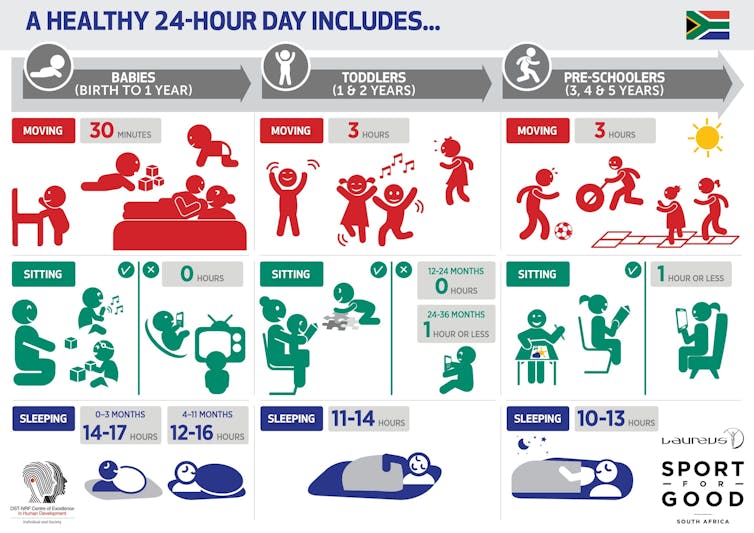Catherine Draper, University of the Witwatersrand
It comes as no surprise that children are spending more time watching screens as a result of the COVID-19 pandemic.
Parents and caregivers in many parts of the world – including South Africa, where I have done research on children’s healthy behaviours – have had a hard time managing their children’s screen time in these last two years. Juggling working-from-home commitments, online educational activities, economic challenges, and illness and grief have been realities, to varying extents, across most households. Screen time can offer a welcome relief when it has all become too difficult to manage.
Global studies have found that young children, as well as older children and adolescents, are getting more screen time than ever. Concerns have been expressed about the impact on their social development and mental health, in South Africa among other countries. Screen time is a concern for young children across a range of settings in South Africa. It can potentially entrench unhealthy habits which become increasingly difficult to change.
Guidelines about healthy levels of screen time might seem unattainable now, and returning to pre-pandemic screen time levels seems unlikely. Guidelines from the World Health Organisation, as well as those developed in South Africa, recommend no screen time for children under the age of two, one hour a day or less for children from two to five years, and less than two hours (of sedentary, recreational screen time) for children over five years.

With holidays around the corner, many parents and caregivers might be worried about how to keep screen time at healthy levels in the home. What can they do to shift things in the right direction, while still staying sane? Drawing on my research and experience, here are some helpful pointers and things to consider:
Content is key: Keeping an eye on what children are watching or playing on screens is critical to ensure that they are being exposed to content that is age-appropriate and beneficial for their holistic development. For example, is it enhancing skills that they will need at school, such as colours, shapes and numbers for young children; and social skills that help them engage in a positive way with their peers for older children and adolescents?
When you can, choose time together: From a developmental perspective, the benefits of in-person engagement trump those from screen time, especially for younger children. The interactions between a caregiver and child are crucial for their cognitive, social and emotional development. This doesn’t have to use expensive resources – talking and singing offer excellent opportunities to stimulate development and develop nurturing connections. For older children and adolescents, try to match screen time with time together to achieve a healthier balance.
It’s okay to make rules: Despite their protests, children thrive with healthy boundaries and rules – even if they can’t see it. Simple rules around screen time can make a significant difference for achieving healthy screen time levels, and also have a positive impact on relationships in the home. Examples include no devices at mealtimes, having a weekly screen free day or a day off from social media, or having a family screen time curfew on certain days.
These have an impact on parents and caregivers own screen time behaviours, but it is essential that they are role models. Boundaries and rules may seem radical at first, but why not start out with a trial period and see how it goes? And brainstorm some other activities that children would like to do with their friends and family members instead of screen time.
Powering down: The negative impact of screen time on sleep is well documented. Limiting screen time as bedtime approaches is probably the most important boundary. As much as it seems to help children to sleep, the level of stimulation provided by screens is generally too much to help them to “power down” for the night. Plus, the blue light emitted by screens actually tells their brains that it is not time to go to sleep. Screen time can have a negative impact on their sleep quality, and how long they sleep. Given the wide range of benefits of sleep for children, this is not a resource that you want to cut down on.
Making the healthy choice is not always the easy choice; COVID-19 has no doubt made these choices even harder. But every small change to promote healthy levels of screen time is a step in the right direction for the health, wellbeing and development of children. While “the earlier the better” applies when making positive changes, it is never too late to start.
Catherine Draper, Associate Professor, University of the Witwatersrand
This article is republished from The Conversation under a Creative Commons license. Read the original article.
